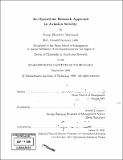An Operations Research approach to aviation security
Author(s)
Martonosi, Susan Elizabeth
DownloadFull printable version (13.27Mb)
Other Contributors
Massachusetts Institute of Technology. Operations Research Center.
Advisor
Arnold I. Barnett.
Terms of use
Metadata
Show full item recordAbstract
Since the terrorist attacks of September 11, 2001, aviation security policy has remained a focus of national attention. We develop mathematical models to address some prominent problems in aviation security. We explore first whether securing aviation deserves priority over other potential targets. We compare the historical risk of aviation terrorism to that posed by other forms of terrorism and conclude that the focus on aviation might be warranted. Secondly, we address the usefulness of passenger pre-screening systems to select potentially high-risk passengers for additional scrutiny. We model the probability that a terrorist boards an aircraft with weapons, incorporating deterrence effects and potential loopholes. We find that despite the emphasis on the pre-screening system, of greater importance is the effectiveness of the underlying screening process. Moreover, the existence of certain loopholes could occasionally decrease the overall chance of a successful terrorist attack. Next, we discuss whether proposed explosives detection policies for cargo, airmail and checked luggage carried on passenger aircraft are cost-effective. (cont.) We define a threshold time such that if an attempted attack is likely to occur before this time, it is cost-effective to implement the policy, otherwise not. We find that although these three policies protect against similar types of attacks, their cost-effectiveness varies considerably. Lastly, we explore whether dynamically assigning security screeners at various airport security checkpoints can yield major gains in efficiency. We use approximate dynamic programming methods to determine when security screeners should be switched between checkpoints in an airport to accommodate stochastic queue imbalances. We compare the performance of such dynamic allocations to that of pre-scheduled allocations. We find that unless the stochasticity in the system is significant, dynamically reallocating servers might reduce only marginally the average waiting time. Without knowing certain parameter values or understanding terrorist behavior, it can be difficult to draw concrete conclusions about aviation security policies. (cont.) Nevertheless, these mathematical models can guide policy-makers in adopting security measures, by helping to identify parameters most crucial to the effectiveness of aviation security policies, and helping to analyze how varying key parameters or assumptions can affect strategic planning.
Description
Thesis (Ph. D.)--Massachusetts Institute of Technology, Sloan School of Management, Operations Research Center, 2005. Includes bibliographical references (p. 151-163).
Date issued
2005Department
Massachusetts Institute of Technology. Operations Research Center; Sloan School of ManagementPublisher
Massachusetts Institute of Technology
Keywords
Operations Research Center.